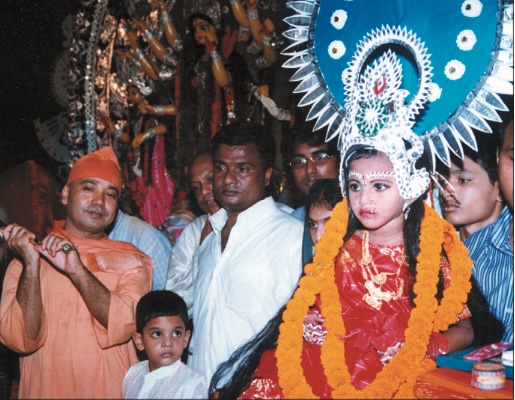By Bashudeb Dhar
Kumari puja is a popular but frequently misunderstood devotional ceremony performed and attended by Hindus of the Sakta sect.
Saktas worship God as Goddess. In Kumari puja, a maiden, who is not yet menstruating, is honored as the Divine Mother and worshiped through elaborate ritual. Such a child is chosen for her untarnished purity. As the great Sakta, Sri Ramakrishna, put it: “All women are forms of the Divine Mother. But Her manifestation is greatest in pure-souled virgins.”
Since Kumari puja differs from the standard Hindu temple puja in that the entity worshiped is a live person, questions might be asked: “What about the many Sakta temples with inanimate icons carved of wood, metal or stone? Is the presence of the Goddess somehow less effective in them for their lack of humanness?” Certainly, the Goddess can make Herself known anytime, anywhere; and one form of worship does not negate another. Yet, Her divine communion is undeniably empowered by the purity of a child. Purity is the key here.
In a deeper sense, Kumari puja is worship of the primal life force within us all. On the physical plane this power manifests most obviously as a woman’s newborn child. On the spiritual plane it is revealed in the experience of eternal bliss. However, our lack of purity can block this bliss. If it is purity we lack, which most of us do, it is purity we will find, at least for a moment, in the divine child worshiped as Kumari, which means virgin.
Kumari puja is not a new practice. In the first century ce, there is scriptural reference to a place called “Koumram” where a Goddess named Kumari was worshiped. The Vedic Goddess Aditi has been extolled for hundreds of years at Cape Comorin as Kanyakumari.
In ancient times Kumari was also known as Uma, Sati, Parvati and Gauri. During a portion of the Hindu marriage ceremony called “Gauri-dan,” the bride is imbibed with the purity of the Divine Mother as a blessing for the groom and the young couple’s future family.
It is my hope that during these difficult times when women are often mistreated as sense objects, servant wives and worse, Kumari puja may be understood for its true value, practiced with its intended sincerity and serve as one of many gateways to the restoration of women’s dignity.


